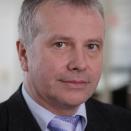Opposition politician Ilja Ponomarev and journalist Natalja Cherkessova on the future of the Russian protest movement
According to Ilja Ponomarev, opposition politician with the “Just Russia” party, the protests have been driven by the new Russian middle class. The former member of the Communist Party’s youth wing pointed out that “until now, these members of the 15 percent were apolitical and kept out of politics.” But then Putin said: “Abandon all hope! I’m coming back for 12 years, and we can even add 12 more years.” That was the straw that broke the camel’s back. The streets filled up with predominantly young, well-educated members of the urban middle class. But as Natalja Cherkessova, the founder of the first liberal newspaper in Leningrad (now St. Petersburg) explained, the protests also had a social dimension: “Almost 60 percent of Russian citizens are poor, cannot find work, have poor access to health care, and have almost no educational opportunities.” This is especially true of the rural population, which has tentatively begun to express its displeasure – a first in post-Soviet Russia. Furthermore, the governing party, United Russia, has given citizens a look at the moral abyss: “Those who committed fraud at polling places were public figures, teachers for example. Supporting such actions among the wider population erodes the foundation of a state,” said Cherkessova.
Opposition Without A Clear Leader
Alexander Rahr, a Russia expert at the DGAP, made clear in his opening speech that Putin must now make a decision: either begin a dialogue or fan the flames of protest by remaining silent. For Ponomarev, the next step is clear: “We need to show them that we will continue to grow.” Whether that can be accomplished with what he calls an “opposition without an organization,” remains in doubt. Marie-Luise Beck, member of European Parliament for the Green Party, is also skeptical: “Shouldn't it be easy for the government to deal with such an amorphous movement?” Ponomarev countered by saying that a national platform would quickly break up due to the movement’s internal and regional disagreements. But with the “aging dictator” Putin heading the government and Medvedev (“a footnote in Russia’s history” according to Cherkessova) at his side as junior partner, there is serious danger of a political shutdown. But former federal minister Volker Rühe disagreed: “You are not being fair to Medvedev. Although he has failed to bring about many legal changes, he has revitalized the entire liberal discourse in Russia.”
Do the protests have a future that can bring about enduring changes? This remains to be seen. Much depends on whether similar voting fraud takes place during the Russian presidential elections on March 4. Putin could possibly fall short of the necessary 50 percent needed to win the first round of voting. “Then he would need to forge a coalition with the liberal camp,” said Rahr. “That would not be bad for Russian democracy.”
